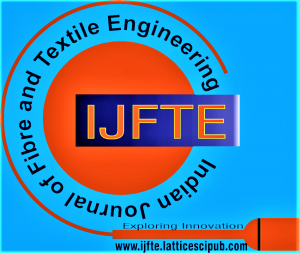![]()
Study on the Quality Characteristics of Slub Yarn Knitted Fabrics
Thanabal V1, Gopalakrishnan M2, Vijayasekar R3
1Thanabal V, Bannari Amman Institute of Technology, Sathyamagalam, India.
2Gopalakrishnan M, Bannari Amman Institute of Technology, Sathyamagalam, India.
3Vijayasekar R, Bannari Amman Institute of Technology, Sathyamagalam, India.
Manuscript received on 02 May 2021 | Revised Manuscript received on 08 May 2021 | Manuscript Accepted on 15 May 2021 | Manuscript published on 30 May 2021 | PP: 10-14 | Volume-1 Issue-1, May 2021 | Retrieval Number:100.1/ijfte.A2404051121
Open Access | Ethics and Policies | Indexing and Abstracting
© The Authors. Published by Lattice Science Publication (LSP). This is an open-access article under the CC-BY-NC-ND license (http://creativecommons.org/licenses/by-nc-nd/4.0/)
Abstract: Coir (Cocos nucifera) is a natural fiber known for its high lignin content which can be effectively made use of provided they are given suitable treatment. Notable disadvantage of natural fiber is its polarity, as they are exposed to diverse pH, salinity, moisture and microbial attack it makes them incompatible with hydrophobic matrix. This paper focuses on modification of coir fiber in improving the durability of fiber and thereby improving the strength characteristics of weak thonnakal soil by suitable sustainable material and fiber. The main idea behind the usage of industrial products is not only conserve the natural resources but a way of implementing two suitable materials to create a ‘synergy’ within the ecosystem. With this view, Flyash was used as a sustainable material. The present work involves modification of coir fiber using chemical treatment called quick precipitation method where nanoparticles of Ca(OH)2 are impregnated into the pores and surface of the fiber. To study the effectiveness upon modification both treated and untreated coir fiber were subjected to alkaline and neutral pH conditions for alternate wetting and drying cycles and its durability was assessed by measuring individual fiber tensile load test. Both treated and untreated coir fiber were added in different percentage from 0.5 to 1.5% to the soil-flyash mix to study the strength improvement by conducting unconfined compressive test. The modified coir fiber was found to withstand adverse durability conditions much better than the untreated coir fiber. Nanomodification of fibers enhanced the interfacial adhesion by better interaction with the soil flyash matrix and the tensile strength also improved. The strength parameter of the soil was also improved upon the addition of modified coir fiber.
Keywords: Coir, Quick precipitation, Durability, Tensile strength.
